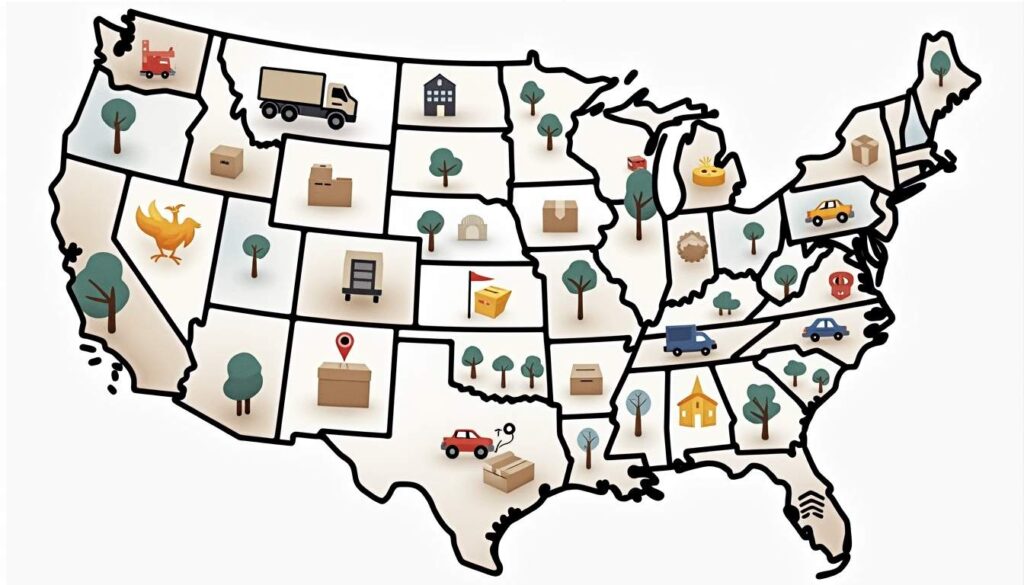Moving across the United States is a significant undertaking that requires careful planning and execution. Whether you’re relocating for a new job, a change in lifestyle, or simply a fresh start, understanding what to expect can help alleviate some of the stress that comes with such a life transition. This article provides insights into various aspects of cross-country moves, from planning and selecting the right moving company to dealing with emotional challenges and legal considerations.
Understanding the Basics of a Cross-Country Move
Before diving into the nitty-gritty of relocating, it’s essential to grasp the fundamental components of a cross-country move. The sheer distance, logistics, and various tasks involved can be overwhelming but manageable with the right approach.
The Importance of Planning Ahead
One of the most critical aspects of a successful move is planning. Starting your preparations several months in advance can make a significant difference. Create a moving checklist that outlines everything from when to start packing to scheduling utility transfers. Allocate time for each task to avoid last-minute rushes, which can lead to mistakes.
Additionally, consider forming a timeline that includes important dates, such as your moving day, travel plans, and possible temporary accommodations if needed. Being organized allows you to handle unexpected challenges with more ease. Furthermore, researching your new area can also be beneficial; familiarize yourself with local services, schools, and community resources. This knowledge can help ease the transition and make you feel more at home even before you arrive.
Deciding What to Pack and What to Leave Behind
Deciding what to take with you can be both liberating and daunting. A cross-country move is an excellent opportunity to declutter your belongings. Evaluate each item and ask yourself if it truly serves a purpose in your new life. Consider donating or selling items that you no longer need or use.
Moreover, remember that larger, heavier items can significantly affect your moving costs due to weight and space. It might be worth it to invest in new furniture when you reach your new home instead of hauling old pieces across the country. Additionally, take inventory of your valuable items and consider their sentimental worth versus their practicality. This process can help you prioritize what truly matters, ensuring that your new space reflects your current lifestyle and needs.
Understanding the Costs Involved
Moving expenses can add up quickly, so it’s crucial to understand all the costs associated with the move. These can include:
- Moving company fees
- Travel expenses
- Temporary storage costs
- Utility setup fees
- Insurance for your belongings
Creating a budget beforehand can help you stay on track and avoid overspending. Remember to account for unexpected expenses and leave a little wiggle room in case of emergencies. Additionally, consider reaching out to friends or family who have recently moved; they may offer valuable insights into hidden costs or tips for saving money. Exploring different moving options, such as renting a truck versus hiring a full-service mover, can also provide you with a clearer picture of what fits within your budget while meeting your needs effectively.
Choosing the Right Moving Company
Finding a reliable moving company is crucial to ensuring the safety and timeliness of your move. With numerous options available, it’s essential to do thorough research.
Factors to Consider When Choosing a Mover
When selecting a moving company, consider factors like customer reviews, experience, and price estimates. It’s advisable to get at least three quotes from different companies to make an informed decision. Review their services, including packing options and insurance coverage, as this may influence your choice.
Don’t forget to check if the company is licensed and insured. A reputable mover should be registered with the Department of Transportation and have the necessary credentials to operate across state lines.
The Role of a Moving Company in a Cross-Country Move
A professional moving company is invaluable during a cross-country move. They handle everything from loading your belongings to transporting them safely to your destination. Their expertise means you’re less likely to encounter issues like damage to your items or logistical errors.
Besides transportation, many movers also offer packing services, which can save you time and stress. Especially if you’re pressed for time, enlisting the help of professionals can make the transition much smoother.
Preparing for the Emotional Impact of Moving
Moving isn’t just about the physical shift; it’s also an emotional journey. Leaving behind familiar surroundings and friends can create feelings of anxiety or sadness.
Dealing with the Stress of Moving
Acknowledging the stress that comes with moving is the first step to managing it. It’s essential to allow yourself time to grieve the loss of your old home and community. Engage in stress-relief activities such as exercising, spending time with friends, or practicing mindfulness techniques to alleviate anxiety.
Additionally, don’t hesitate to ask for support from loved ones. Sharing your experience can provide comfort and make the process feel less isolating.
Saying Goodbye to Your Old Home and Community
Saying goodbye can be challenging, especially if you have deep-rooted ties to your community. Hosting a farewell gathering can provide closure and allow you to share memories with cherished friends and neighbors.
Take some time to reflect on what you’ll miss about your old home and celebrate those experiences, but also focus on what lies ahead. Embracing the change will help ease the transition to your new life.
Settling into Your New Home
Once you arrive at your new destination, the settling-in process begins. While unpacking and getting acquainted with your new surroundings can be daunting, it’s also an exciting part of the move.
Tips for Unpacking and Organizing
Begin unpacking strategically. Start with essentials such as kitchen items, toiletries, and clothes to make your new home livable quickly. As you unpack, take the opportunity to organize items in a way that makes sense for your new space.
Consider designing each room one at a time rather than attempting to unpack all boxes at once. This approach makes the process less overwhelming and gives you a clearer vision of what your new home will look like.
Getting to Know Your New Community
Integrating into a new community can be a rewarding experience. Take time to explore your new neighborhood, visit local shops, parks, and community centers. Attending local events or joining clubs can help foster connections and friendships.
Meeting new people and enjoying the local culture will make your new place feel like home in no time. Approach this phase with an open mind and a positive attitude, and you’ll create lasting memories in your new environment.
Legal and Logistical Considerations
Moving involves several legal and logistical responsibilities that should not be overlooked. Being proactive will save you time and effort down the road.
Updating Your Address and Other Important Information
As soon as you secure your new home, update your address with various organizations, including the post office, banks, and any subscription services. Notifying significant entities promptly ensures you won’t miss important communications.
Don’t forget to update your driver’s license and vehicle registration if you’re moving to a different state, as each state has specific requirements for residents.
Understanding State-Specific Laws and Regulations
Every state has different laws and regulations regarding residency, taxes, and property ownership. Familiarize yourself with these changes to avoid any legal issues after your move. Look up information on state taxes, voter registration, and any homeowner regulations that may impact your situation.
Researching laws that pertain to your new state can lead to smoother transitions regarding paperwork and requirements, ultimately easing your move-in process.
By being informed and prepared, you can reduce the uncertainties of moving. While it can be a demanding process, understanding what to expect at each step can lead to a successful and rewarding relocation experience.
















